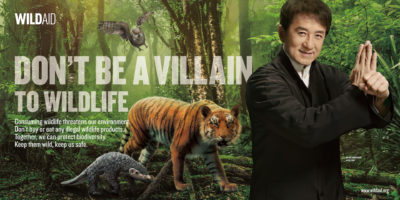
Beijing – September 14, 2021 – Martial arts superstar and wildlife champion Jackie Chan calls for an end to consuming wild animals in our newest public service announcement in partnership with the China Wildlife Conservation Association and Pangolin Crisis Fund. The PSA was released today to support China’s decision to ban the trade and consumption of terrestrial wild animals that was adopted at the 16th Meeting of the Standing Committee of the 13th National People’s Congress in February 2020.
The video, entitled “Don’t Be a Villain to Wildlife,” features Jackie Chan attending an audition for ‘Heroes protecting nature’ where he shows off his Kung Fu skills and his firm stance on refusing consumption and trade of wildlife, which wins him the applause of the wild animals he suddenly finds behind him. “Everyone has a responsibility to reject behaviors that harm nature and promote conservation among our families and friends, as well as report illegal wildlife trade. When we do this, we are all heroes protecting nature,” said Chan.
The video and accompanying billboard campaign will be distributed widely in China over the next 10 weeks.
The decision adopted on February 24, 2020, reinforces wildlife protection by ensuring:
- All wild animals protected under the Wildlife Protection Law and other relevant laws of the People’s Republic of China are prohibited from being hunted, traded, transported, or consumed.
- All terrestrial wild animals, including those with important ecological, scientific, or societal values, and those that are artificially bred or raised, are banned from consumption.
- All terrestrial wild animals that naturally grow and reproduce in the wild are also prohibited from being hunted, traded, or transported for the purpose of their consumption.
In addition to the nationally protected species list, each province has a list of locally protected wildlife species. Secretary-General Wu Minglu of the China Wildlife Conservation Association stated: “The ban on the consumption of terrestrial wild animals not only protects human life, health and safety but is also an important measure to protect biodiversity.”
China will hold the 15th meeting of the Conference of the Parties to the Convention on Biological Diversity (COP15) in October. “It’s a good time to launch the ‘Don’t Be a Villain to Wildlife’ campaign to encourage people to protect biodiversity by taking simple actions,” said Yu Chong, the Chief Representative of WildAid China.
The comprehensive global assessment of hunting of terrestrial wildlife published by The Royal Society in 2016 revealed evidence of a global crisis: among the 1,169 species of terrestrial mammals listed by the International Union for Conservation of Nature (IUCN) as “threatened with extinction,” more than a quarter (301 species) listed “hunting by humans” as the primary threat, including all eight pangolin species around the world.
This assessment also found that the primary reason for hunting and trapping these mammals is to acquire meat for human consumption, followed by the desire for medicinal products, ornamental use, and pet trade. The unsustainability of these practices has accelerated in many areas due to growing human populations, increasing commercial trade in wild meat, and the widespread adoption of firearms and motorized transport that increase the efficiency and spatial extent of hunting. This persistent pressure on such ecosystems has the potential for massive effects beyond species lost, such as changing ecosystem structure or the services it provides; this could result in a loss of food security for humans and a rise in zoonotic disease risks.
“Wildlife have immeasurable value to biodiversity and to the sustainable development of humans,” said Chong, “we will definitely do more to raise public awareness on that.”
Stay in touch and get the latest WildAid updates.
SIGN UPAbout WildAid
WildAid is a non-profit organization with a mission to protect wildlife from illegal trade and other imminent threats. While most wildlife conservation groups focus on protecting animals from poaching, WildAid primarily works to reduce global consumption of wildlife products such as elephant ivory, rhino horn and shark fin soup. With an unrivaled portfolio of celebrity ambassadors and a global network of media partners, WildAid leverages more than $308 million in annual pro-bono media support with a simple message: When the Buying Stops, the Killing Can Too.
Journalists on deadline may email communications@wildaid.org